You'd be hard-pressed to find a player who has risen through the pro ranks as quickly as forward Marc Johnstone.
Two years ago, Johnstone was a recent graduate of Sacred Heart University. He was beginning his first season of professional hockey on an ECHL-level contract with the Newfoundland Growlers, the "AA" affiliate of the Toronto Maple Leafs. Players on ECHL contracts don't have guaranteed deals -- they have to earn their spot on the team's 20-man roster every day, or they risk being cut and sent home with nothing.
Johnstone earned an AHL contract with the Toronto Marlies last season, and performed well enough to turn that into a two-year, two-way NHL contract with the Penguins this summer.
"It was an unreal experience to do that with my family at home," Johnstone told me of signing that NHL contract. "I'm definitely happy to be here and I'm looking forward to what lies next."
After participating in the NHL training camp and playing in his first-ever NHL preseason game, Johnstone was re-assigned to Wilkes-Barre/Scranton to start the year in the AHL, where he'll look to continue his quick rise and earn a call to the NHL.
Johnstone, 27, describes himself as a "hard-nosed, two-way forward."
"I like to play physical, I like to get under a team's skin," the 6-foot, 181-pound ring wing added. "I like to just get on the forecheck and be hard and make my presence known that way and be good defensively."
Johnstone's preseason NHL debut came in the Penguins' preseason opener against the Blue Jackets, and Johnstone was frequently noticeable with that "hard-nosed" style of play. He played 10:04 in a fourth-line right wing role, and tied for the team-lead in hits with five. Penguins assistant coach Mike Vellucci, who served as head coach for that game, was impressed with Johnstone's game beyond just that physical play.
"I thought he had a really good game," Vellucci said afterward. "He simplified the game, he put the puck in the right spots, he was physical. You know, I like his experienced game, if that makes sense. Every time it was on his stick, he was in the right spot. He was hunting pucks all night. All those details were dialed in tonight, and that's what I really liked."
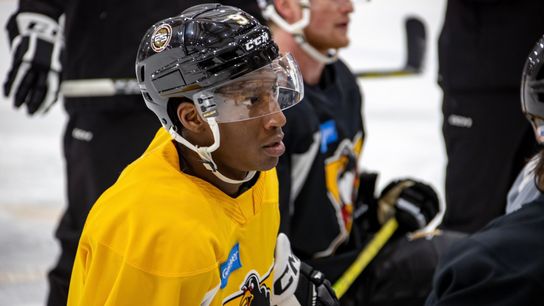
WBS PENGUINS
Marc Johnstone in practice in Wilkes-Barre
Johnstone, a native of Cranford, N.J., grew up a fan of his hometown Devils. He wore No. 26 most of his life as a nod to Patrik Elias, and also looked up to the likes of Zach Parise, John Madden and Brian Gionta, trying to take pieces of their games and emulate them himself. The player he grew up watching who he tries to model his game after he most came from a division rival, though.
"Wayne Simmonds, I actually took a lot from him growing up, he was in Philly for most of my time watching," explained Johnstone. "Just his tenacity and how he goes to the net and his puck pursuit, I kind of drew from that."
Johnstone knew he wanted to be a professional hockey player since he was young, but his journey has been an uphill climb. He played junior in the USHL for two seasons until he was 20, playing for the Chicago Steel and winning a Clark Cup in his last season of junior hockey. He attended Sacred Heart University, a school that has a smaller hockey program and had not yet produced an NHL player at the time Johnstone was a student. Forward Justin Danforth, who graduated the year before Johnstone's freshman season, went on to make his NHL debut with the Blue Jackets in 2021 and is still the only Sacred Heart product to play in a regular-season NHL game.
"Coming from a smaller school, you kind of have to have a chip on your shoulder," Johnstone said.
Some teammates of Johnstone's also went on to play professional and earn contracts with NHL teams, and he said that's when it started to sink in that becoming a professional hockey player was an actual, obtainable goal for him.
Some worry started to set in for Johnstone's senior year in 2020-21. COVID shortened Sacred Heart's schedule by nearly half the amount of games, with just an 18-game schedule. Johnstone was limited to 16 games that year after a bout of COVID himself. He still managed to tie for the team-lead in scoring with six goals and 10 games, and won the Peter Downey Award for the second year in a row as Sacred Heart's most valuable player. But he was concerned that the shortened schedule and closed games limited professional teams' ability to come see him play.
"I was just fortunate enough to get a shot in Newfoundland, and it turned out to be an unbelievable destination," Johnstone said.
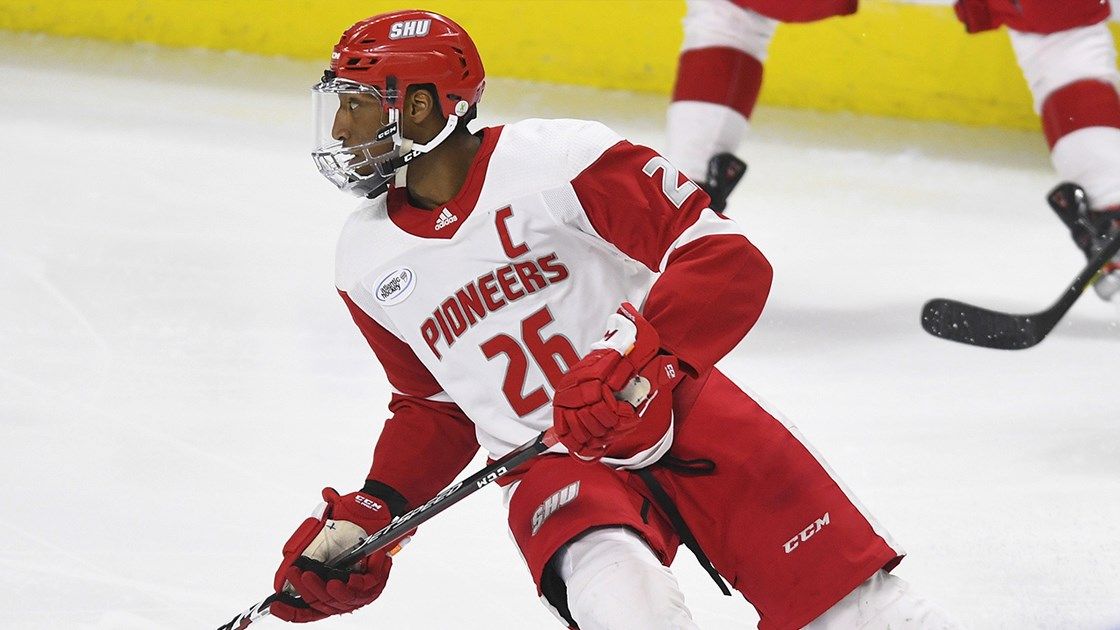
SACRED HEART ATHLETICS
Marc Johnstone with Sacred Heart University
Johnstone was one of the first players signed by the Newfoundland Growlers to an ECHL contract ahead of the 2021-22 season. He credits Newfoundland's returning pros like Zach O'Brien, Derian Plouffe, and James Melindy with establishing a good culture and instilling good pro habits in first-year players like himself. Johnstone gained valuable experience playing in different situations like the power play and penalty-kill, and finished the year with seven goals and 14 assists in 58 games, as well as four goals and four assists in 19 playoff games before Newfoundland fell in the Eastern Conference Final.
"It was nice to play both sides of the puck, just learn through the experience of getting to play through tough situations," Johnstone said of his first professional season.
Johnstone got his first taste of the AHL that year with the Toronto Marlies, too. Johnstone earned a four-game stint on an AHL tryout contract to finish the season. When it was time to sign a contract that summer, the Marlies inked him to a full AHL contract.
It was a pretty seamless transition for Johnstone, who scored nine goals and 13 assists in 69 games in his first AHL season. Greg Moore, who coached the Marlies last season, told me that Johnstone was "one of our best players last season in our team, and definitely our most consistent player in a lot of ways."
The whole squad is absolutely FIRED UP for Marc Johnstone's 1st AHL goal 😭💙 pic.twitter.com/CEWBow1O5Y
— Toronto Marlies (@TorontoMarlies) January 15, 2023
JOHNSTONE WHILE FALLING DOWN 💪 pic.twitter.com/yrE7TcbpwC
— Toronto Marlies (@TorontoMarlies) January 26, 2023
"He's just the ultimate team guy," Moore said of Johnstone. "He out-competes everybody and is willing to do anything to help the team win. His style of play, it would be more of a checker. But he's very effective playing that style, has a nose for getting to the net and still finding points within his skill set."
Moore credits Johnstone's personality for his quick rise through the professional ranks -- calling him a "good teammate" and praising his work ethic, consistency and compete. But he also credited Johnstone's ability to do the little things that help a team win but might not show up on a scoresheet.
"He might be one of the best players in doing those things that I've seen," Moore said.
Moore pointed to things like Johnstone's shot-blocking, ability to finish his hits, play at the net-front and just be "hard to play against" in general. He has good habits on and off the ice, and Moore said that Johnstone's habits are infectious when it comes to spreading good team culture.
"You always find yourself rooting for a guy like that, wanting to give them more opportunities," Moore said. "He always takes advantage of the opportunity that he gets. ... He's an incredible human being."
Johnstone skated primarily in a bottom-six role with the Marlies, but was moved up to the top-six at various times throughout the season, and not just because there were openings due to injuries or call ups.
"There were plenty of times that we played him up in top six roles to help some of our more skilled players get their games going," Moore said. "Because with how fast, competitive and physical he was, he created more time and space for his linemates to have more options and more time with the puck."
Johnstone thinks that it's his ability to read the game that has him able to play up and down a lineup.
"I like to read off of other players," he said. "I think whether it's a chip and chase game, or it's a little bit of a skill game, I can bring some grit to a line, and we can produce any way you'd like, any way you need or any way that the team needs. It doesn't matter what position you're in, you have to go out there and play your hardest and play your best. And that's just what I'm trying to do."
Moore said that to reach the next level, he believes Johnstone could stand to improve his skating, his shooting, and finding more pockets of space in the offensive zone for himself.
"He's always so willing to go in the corners and do the dirty work and get the pucks back to the team," Moore said. "There's times for him to find soft areas to create offense for himself. He can get into those spaces a little bit more."
If Johnstone can do that, Moore absolutely believes that his ceiling is that of an NHL player.
"I definitely think he can be a bottom-six player for an NHL team who just consistently helps you in hockey games," Moore said. "You may actually never notice him on the ice because he's not a flashy player by any means. But he's somebody that you can rely on day in and day out."
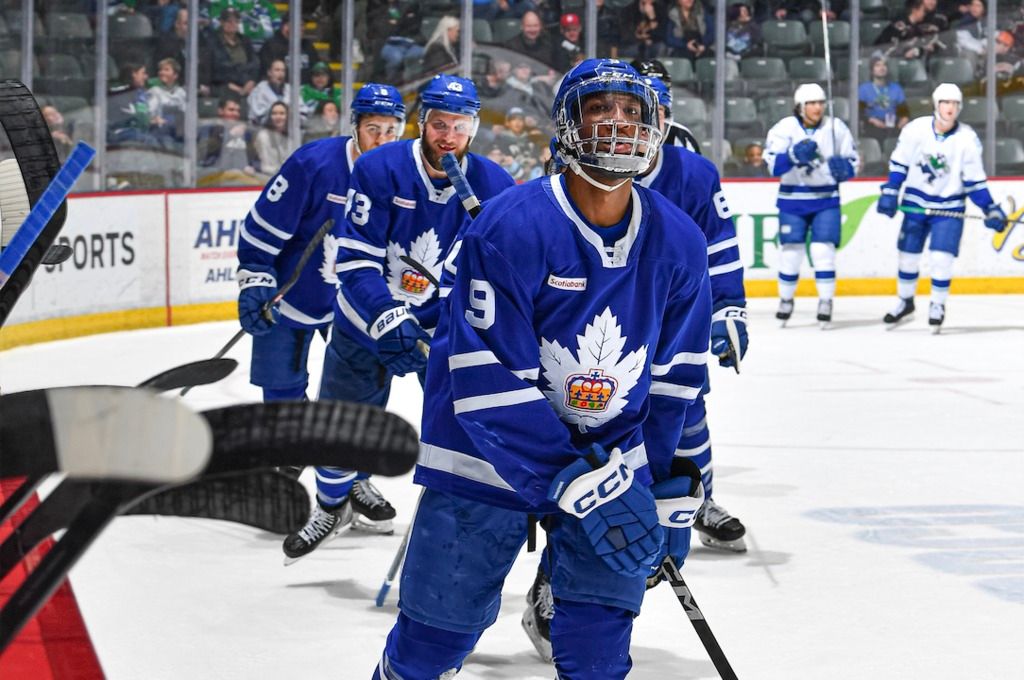
TORONTO MARLIES
Marc Johnstone with the Toronto Marlies last season
Kyle Dubas appreciated what he saw from Johnstone playing for his AHL affiliate in Toronto last season, and rewarded him with his first NHL contract with the Penguins on the second day of free agency. Johnstone is one step closer to his goal of playing in the NHL.
Wilkes-Barre is two games into its regular-season schedule, opening the year with a pair of games on the road against the Charlotte Checkers -- a 4-2 win on Friday and a 4-1 loss the following night. Johnstone is starting on the right side of a fourth line opposite Corey Andonovski and centered by Jonathan Gruden, a trio that has the makings of a solid, physical line that's good in their own end. Johnstone was a plus-1 and recorded a total of three shots on goal in those two games.
Johnstone said that he's still learning the ins and outs of the systems that Wilkes-Barre plays with, which are pretty similar to those in Pittsburgh, to ensure a seamless transition when a player gets called up. He said that the main emphasis from the coaches, though, has just been to "play my game" and make reads like he's been doing his whole life.
"I started on the fourth line, and I'm just working my way up," he said. "I'm just learning the niches of the systems that we have here and just learning other players in the organization and getting comfortable and just playing my game."
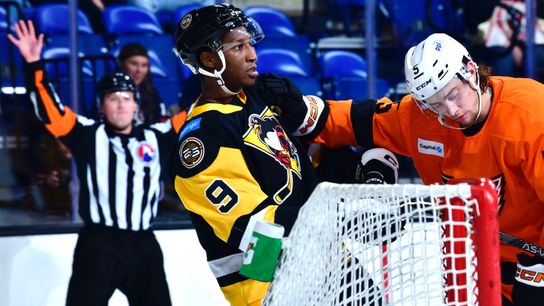
WBS PENGUINS
Marc Johnstone in the preseason with Wilkes-Barre/Scranton
Johnstone, obviously, is no stranger to working his way up. He's done it surprisingly fast. I asked him why he thinks that has been the case -- was he simply someone who flew under the radar as a young player, or was he more of a late bloomer?
He thinks it's a little of both.
"I definitely bloomed later, be it juniors or college, and then coming into pro game at 24, 25," he said. "You're not a young kid, so you've got to pretty much move up fast and do the right thing. I took that as like a chip on my shoulder. I just had to play my game and just had to keep proving people wrong. ... It's definitely been a nice, crazy road for me, from Newfoundland to Toronto to here. I'm just happy that I can keep progressing. I have a lot of work to do ahead of me."
Johnstone's professional career has been on the fast track for a little over two years now. He's hoping to ride that track all the way to the NHL sooner rather than later.
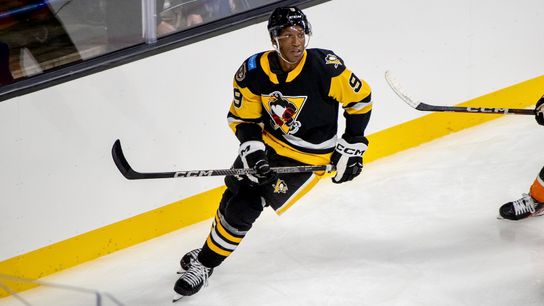
WBS PENGUINS
Marc Johnstone skates in the preseason with Wilkes-Barre/Scranton

